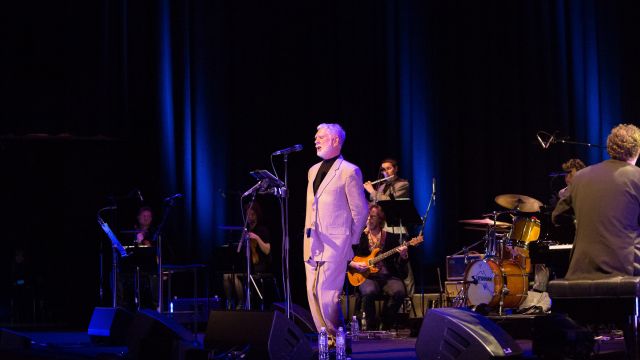The Art of Protest
Image: Vince Jones - Photo by Kevin Peterson
Billed as a world premiere and Adelaide exclusive, The Art of Protest is written and narrated by an animated Brian Nankervis (RocKwiz, The Friday Revue) and seems a pertinent choice of theme for our troubled times. There are interesting tales to accompany the songs though Nankervis’ introductions did read a little like Wikipedia entries at times. The music was the hero though and the audience was vocally appreciative.
After a somewhat desultory flugelhorn solo, Jones launched into the vocals for ‘Strange Fruit’ and did not play any instruments for the remainder of the performance. Penned by Abel Meeropol, a teacher and civil rights activist from the Bronx, ‘Strange Fruit’ was written first as a poem motivated by a 1930s photograph depicting the lynching of two African American men in Indiana. Made famous by Billie Holiday in 1939, the song reminded her of her father who died from lung disease after being turned away from hospital because of his colour. In 1999, Time magazine designated ‘Strange Fruit’ the ‘song of the century’ and eventually, Holiday was posthumously awarded 23 Grammys and inducted into the National Rhythm & Blues Hall of Fame.
‘Strange Fruit’ was an apt beginning for a program of protest songs, and despite his 67 years and less than perfect horn solo, this artist still has a great jazz voice. John Lennon’s ‘Imagine’ was next and Jones’ emotive vocals suited the moodiness and longing. This song has been covered by many, but perhaps the most poignant performance was outside the Bataclan Centre in Paris by Davide Martello in 2015, the day after the venue was stormed by armed attackers during a concert and 127 people killed across multiple sites in the city. Jones spoke after the song saying that in an ideal world, how wonderful it would be if the good we can imagine could come true.
Horace Silver wrote ‘Old Mother Nature Calls’ in the 70s and Vince Jones (apparently a keen gardener who grows his own food) obviously delights in singing it. With lyrics like ‘The food we eat today is filled with toxic spray, The hormones that they add will slowly drive you mad...’, it was ahead of its time. Another 70s song follows: Gil Scott-Heron’s ‘Whitey on the Moon’ inspired by a statement from writer and activist Eldridge Cleaver who argued that the space program was a distraction from internal problems in the US. Originally a spoken word poem with underlying drum rhythm, Jones gives a melodic interpretation of the work.

Moving on to an Australian protest song, John Schumann’s ‘Only 19’, the jury might still be out on the jazz-style interpretation. The importance of this work goes beyond the intensely emotional story, partly based on Schumann’s brother-in-law’s tales. The song’s original title was ‘A Walk In The Light Green,’ referencing the colouring of army maps where pale green indicated thinly wooded areas, little cover and a high likelihood of land mines. ‘Only 19’ and the reactions to it also acted as a catalyst for many reforms with regards to our Vietnam veterans, prompting a royal commission into the use of chemical agents in war and helping to establish the official memorial for Vietnam veterans in Canberra. To this day, royalties from the song are paid to the Vietnam Veterans Association.
Two more Australian songs were featured later to great applause: Kev Carmody’s ‘Thou Shalt Not Steal’ and Archie Roach’s ‘Took The Children Away’. Both versions of these songs were quite special and deeply moving and sadly still relevant today given the many injustices our First Nations people still face. Thou ‘Shalt Not Steal’ was delicately accompanied on piano only, and ‘Took The Children Away’ began with solo piano but gradually swelled to include the entire band.
A highlight before interval was Marvin Gaye’s ‘What’s Going On’ where the jazz style and talents of the assembled band really shone. Further in, two of Jones’ own songs featured, ‘Luncheon With The President’ and ‘Nature Of Power’, both released in 1995 when the singer was deeply observant of the state of the world under George Bush’s political influence. Pete Seeger’s ‘If I Had a Hammer’, another song covered by many, many artists, was the final song. A brave choice for an encore was ‘Dear Mr President’, written by Pink and originally featuring the Indigo Girls. Jones’ version did not do the song any justice, but the heart was in the right place.
The band assembled for this Cabaret Festival gig is quite simply magnificent: James Hauptmann (drums), Ben Hauptmann (guitar), Jacques Emery (double bass), John Mackey (saxophone) and musical director and pianist, Matt McMahon. Despite the musical brilliance assembled, and the much hyped ‘world premiere’ tag, there was an unrehearsed air about the performance. As he sang, Jones was scrolling through the lyrics on a tablet and referring to them with alarming regularity. There seemed to be some song key and starting note confusion at times and Jones could be seen conferring with McMahon then searching for the melody line at the start of a few songs.
An interesting and inspiring idea for a cabaret show in 2021 and peopled with stellar musicians and song choices. The Art Of Protest for the most part was very involving musically but disappointing in its cohesiveness, a rewarding musical adventure but a performance in need of some polish.
Lisa Lanzi
Subscribe to our E-Newsletter, buy our latest print edition or find a Performing Arts book at Book Nook.

